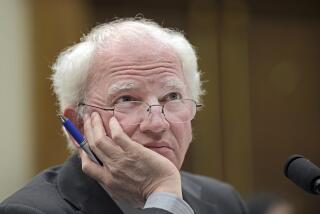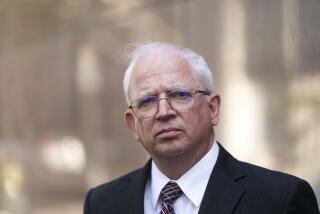State Action Not Seen as Threat to Future of Ernst & Young
- Share via
The move by California officials to seek a revocation of the accounting license of Ernst & Young may tarnish the firm’s reputation a little more but is unlikely to result in major damage to the firm’s operations in the long run, industry officials said Wednesday.
The staff of the state Board of Accountancy has recommended that the board revoke or suspend Ernst & Young’s license to do business in California because of “gross negligence” in audits of Irvine-based Lincoln Savings & Loan and its parent firm, American Continental Corp. of Phoenix.
But the state agency, which regulates the accounting industry, has never taken such strong action against a major firm. And the drastic action would cause a severe economic hardship for thousands of Ernst & Young employees and clients, who would have to find new auditors.
“Historically, that sort of Draconian penalty has not been imposed, and I would be very surprised for it to be imposed in this situation,” said John C. Burton, a professor of accounting and finance at Columbia University’s Graduate School of Business.
As far as the Lincoln case goes, they “haven’t done anything wrong yet,” said Don Murray, an accounting partner at Deloitte & Touche in Costa Mesa. “It’s just people making allegations in the paper.”
Nonetheless, Ernst & Young faces some serious problems in California and elsewhere stemming from audits of thrifts. The firm was created last year from the merger of Arthur Young & Co. and Ernst & Whinney, both of which had substantial practices among financial institutions.
“Their involvement with savings and loans has not enhanced their reputation,” Burton said, “but to blame all the problems on the accounting firms is unjust.”
The California accounting practice is important to Ernst & Young, which is probably one of the top three firms in the state in terms of size. The company, however, would not release figures on the number of partners, employees or revenues generated in the state.
Ernst & Young has 23,000 partners and employees nationwide and 67,000 worldwide, more than any other accounting firm. Its revenues for the year ended Sept. 30 were $2.2 billion nationwide and $5 billion worldwide. It is the second largest firm in Orange County.
Karen J. Scott, the interim managing officer for the state board, filed the administrative action against Ernst & Young on Nov. 16. The accusations, which Ernst & Young denies, sets into motion a hearing procedure before an administrative law judge.
While the staff recommends the revocation or suspension of Ernst & Young’s license, the hearing could also result in a reprimand, probation or no action at all. The action also names Arthur Young and Francis J. O’Brien, a partner who did the work on Lincoln.
The action is the most ambitious ever brought by the board’s staff. Scott said it marks only the second time the staff has sought to revoke the license of a major firm.
Last year, the board took action against KMG Main Hurdman for its audits of Technical Equities Corp., a San Jose investment firm in which investors lost $150 million when it crashed in 1986.
The firm turned in its license last year and paid about $1 million to settle the case, and several accountants were put on probation. But the action had little effect on the firm because it already had merged into what then was the nation’s biggest accounting firm, KMPG Peat Marwick Main.
Ernst & Young officials said they won’t even consider the possibility that the severest sanction--a license revocation--would be imposed. They said they will fight the state accusations vehemently.
The action comes at a time that the work of accountants is being questioned nationwide, particularly relating to savings and loans. So far, five of the nation’s six major accounting firms have been sued by regulators over their audits of failed thrifts, said John P. Owen, a Phoenix lawyer for federal thrift regulators.
Arthur Young is being sued for more than $1 billion in connection with its audits of Lincoln, Western Savings in Dallas and several failed Tennessee thrifts. Regulators are seeking $560 million alone in the Western case.
In other actions this year, Arthur Young has lost a $5-million jury verdict in an Orange County case and a $19-million verdict in a Hawaii case. Both cases are on appeal.
California officials charge in the administrative action that Ernst & Young was “grossly negligent” by failing to follow proper accounting procedures in audits of the 1987 financial statements of Lincoln and its parent firm, American Continental Corp. in Phoenix.
The result was that the financial statements showed the company with pretax earnings of $26 million when it should have showed an annual loss of $36 million, according to the filing.
Arthur Young’s work was used by the company to push about $200 million in corporate bonds mainly to elderly deposit customers at Lincoln’s 29 Southern California branches. The bonds have become worthless since the company filed for bankruptcy protection in April, 1989, and regulators seized the S&L; the next day.
The thrift’s collapse is expected to cost U.S. taxpayers more than $2 billion, making it one of the most expensive failures ever.
“The firm stands behind its work,” said Mort Meyerson, a spokesman for Ernst & Young. “All standards were followed.”
More to Read
Inside the business of entertainment
The Wide Shot brings you news, analysis and insights on everything from streaming wars to production — and what it all means for the future.
You may occasionally receive promotional content from the Los Angeles Times.










